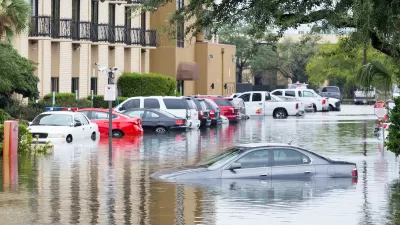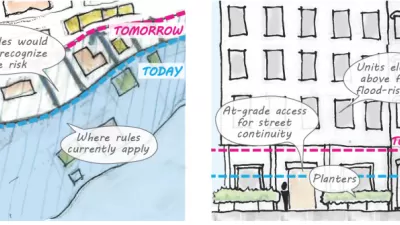Hurricane Sandy demonstrates that the impacts of climate change -- rising sea levels and more extreme weather patterns -- mean that the future of America's coastal cities is in doubt.
Mike Tidwll, writing for The Nation, argues that all coastal American cities are facing the fate of New Orleans, and that hard decisions lie ahead: either these great cities are to be abandoned, or they commit to increasingly more sophisticated and expensive systems of levees and dikes. The most difficult adjustment, however, is to move rapidly away from the burning of fossil fuels. He writes,
"The New York Academy Sciences has already begun examining the viability of three massive floodgates near the mouth of New York Harbor, not unlike the Thames River floodgate that protects London today. Another floodgate has been proposed for the Potomac River just south of Washington, fending against tsunami-like surge tides from future mega storms. Plus there will be levees-everywhere. Imagine the National Mall, Reagan National Airport and the Virginia suburbs-all well below sea level-at the mercy of "trust-us-they'll-hold" levees maintained by the Army Corps of Engineers.
Oceans worldwide are projected to rise as much as three more feet this century-much higher if the Greenland ice sheet melts away. Intense storms are already becoming much more common. These two factors together will in essence export the plight of New Orleans, bringing the Big Easy 'bowl' effect here to New York City and Washington, as well as to Charleston, Miami, New York and other coastal cities. Assuming we want to keep living in these cities, we'll have to build dikes and learn to exist beneath the surface of surrounding tidal bays, rivers and open seas-just like New Orleans."
FULL STORY: We Are All from New Orleans Now: Climate Change, Hurricanes and the Fate of America's Coastal Cities

Planetizen Federal Action Tracker
A weekly monitor of how Trump’s orders and actions are impacting planners and planning in America.

San Francisco's School District Spent $105M To Build Affordable Housing for Teachers — And That's Just the Beginning
SFUSD joins a growing list of school districts using their land holdings to address housing affordability challenges faced by their own employees.

The Tiny, Adorable $7,000 Car Turning Japan Onto EVs
The single seat Mibot charges from a regular plug as quickly as an iPad, and is about half the price of an average EV.

With Protected Lanes, 460% More People Commute by Bike
For those needing more ammo, more data proving what we already knew is here.

In More Metros Than You’d Think, Suburbs are Now More Expensive Than the City
If you're moving to the burbs to save on square footage, data shows you should think again.

The States Losing Rural Delivery Rooms at an Alarming Pace
In some states, as few as 9% of rural hospitals still deliver babies. As a result, rising pre-term births, no adequate pre-term care and "harrowing" close calls are a growing reality.
Urban Design for Planners 1: Software Tools
This six-course series explores essential urban design concepts using open source software and equips planners with the tools they need to participate fully in the urban design process.
Planning for Universal Design
Learn the tools for implementing Universal Design in planning regulations.
Smith Gee Studio
City of Charlotte
City of Camden Redevelopment Agency
City of Astoria
Transportation Research & Education Center (TREC) at Portland State University
US High Speed Rail Association
City of Camden Redevelopment Agency
Municipality of Princeton (NJ)





























